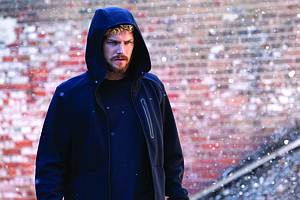3/17/2017

Every company is due for a dud. Marvel had given its three other Defenders properties their own identity and appeal. Daredevil took up Hell’s Kitchen with plenty of Catholic virtue about revenge wrapped around a constantly tectonic shift. Jessica Jones gave more weight to its characters and the power of will. Luke Cage allowed Harlem to breathe as a living set piece from music to ideology on down. So where in New York did that leave Iron Fist? The most supernatural of the four Defenders characters, his story seemed far more intriguing on a surface level than his three counterparts.
Over the course of the first six episodes* of Marvel’s fourth foray into set ups for The Defenders, Danny Rand (Finn Jones) stumbles into a world of naiveté that gets far more convoluted as time progresses. Iron Fist slips up in regards to the punches it wants to throw and pull; the stories it wants to lead the audience on. The initial introduction we have to Rand is him walking down a street, barefoot while listening to OutKast’s “So Fresh, So Clean”. Commendable since the plot of Iron Fist asks us to believe that iPods were still a thing in 2001. However as the first episode reveals, it’s a dowdy paced, fish-out-of-water tale that sometimes decides to bring action into it.
Rand returns to New York, 15 years following he and his parents’ plane crashed in the Himalayas. His entire existence in New York has been washed out and as the heir to a family enterprise worth billions, he wants answers. The Meachum kids Ward (Tom Pelphrey) & Joy (Jessica Stroup) who’ve ascended to the throne in his place are steadfast at keeping him from it. All of this is standard plot devices for any superhero to give his identity a bit of a humane aspect to it. But Iron Fist does this terribly, almost to the point where it feels more like a badly thought out procedural drama rather than mystical superhero show.
What faults Iron Fist outside of a plodding script and plot that are nowhere near as engaging as they were in the three other Netflix shows? Almost everything else. Jones’ Rand is more aloof surfer type than controlled practitioner of taoism. The episodes drag into a sluggish nature and when action does arrive, it arrives with little heart or bite attached to it.
Iron Fist’s entire appeal as a hero is the action seeing that he’s the greatest warrior of the four Defenders. But in his own show, he arrives to a very weird point. How does the one character in Netflix’s Marvel universe be such a dull in the one aspect that he’s suppose to be superior? Luke Cage & Jessica Jones were blunt with their action, elevated by strong plot devices of womanhood and African-American culture, respectively. Rand? Nothing. Just drab boardroom dynamics and exposition where Danny explains to Jessica Henwick’s Colleen Wing the finer aspects of running a dojo and how he’s better at it — in the middle of the damn dojo that she owns. Yes, it’s as condescending as the last sentence made it out to be.
What actually does go right in the world of Iron Fist are its female protagonists. Stroup’s Joy Meacham is the lone member of the family with a semblance of heart and knowledge of gravity. Carrie-Anne Moss’ Jeryn Hogarth returns to represent Rand in his re-takeover of his father’s company. Rosario Dawson’s Claire Temple once more proves that the Night Nurse is the sole unifier of this entire Netflix Universe. But Henwick as Colleen Wing is the series true regular bright spot, even if the show routinely tells us that her partner-in-crime in regards to defeating The Hand is a Very Special White Guy.
Henwick portrays Wing with a sense of urgency, a woman with a determined purpose that goes well beyond the “save the universe” trope that Iron Fist runs into. To her, it’s about keeping the lights on, saving kids through martial arts and learning how to combat her own blood lust. If we find no redeemable qualities in Danny Rand himself, then how are we expected to endure the second half of the season? Even RZA, someone who has spent years making his own serviceable, if not great kung-fu action movies couldn’t manage to save episode 6. And it’s the episode he directed.
I could run off the number of stereotypical hero arcs Iron Fist runs into from the first six episodes. The “hero Gaslighting” moment? Episode 2. The son turning into a disappointing henchman with father issues? Episode 1. Our hero running into a gauntlet to truly prove his powers? Episode 6. Normally, Marvel’s Netflix series hit a wall around the mid-point of a season, around episode 8 or 9 before finding balance and confidently seeing the ends through. Iron Fist is already there, well before things actually get interesting.
